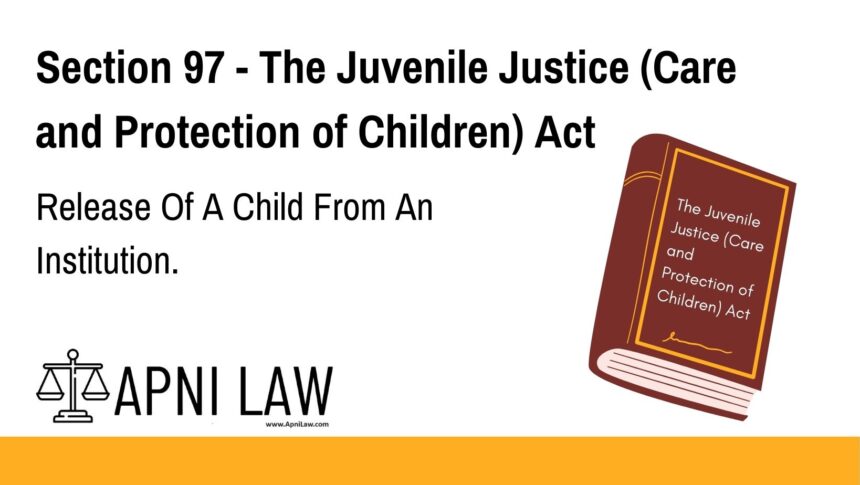Code: Section 97 of the Juvenile Justice (Care and Protection of Children) Act, 2015
(1) When a child is kept in a Children’s Home or special home, on a report of a probation officer or social worker or of Government or a voluntary or non-governmental organisation, as the case may be, the Committee or the Board may consider the release of such child, either absolutely or on such conditions as it may think fit to impose, permitting the child to live with parents or guardian or under the supervision of any authorised person named in the order, willing to receive and take charge, educate and train the child, for some useful trade or calling or to look after the child for rehabilitation:
Provided that if a child who has been released conditionally under this section, or the person under whose supervision the child has been placed, fails to fulfil such conditions, the Board or Committee may, if necessary, cause the child to be taken charge of and to be placed back in the concerned home.
(2) If the child has been released on a temporary basis, the time during which the child is not present in the concerned home in pursuance of the permission granted under sub-section (1) shall be deemed to be part of the time for which the child is liable to be kept in the children or special home:
Provided that in case of a child in conflict with law fails to fulfil the conditions set by the Board as mentioned in sub-section (1), the time for which he is still liable to be kept in the institution shall be extended by the Board for a period equivalent to the time which lapses due to such failure.
—
Explanation of Section 97 JJ Act
Section 97 allows the release of a child from a Children’s Home or Special Home. The release may be absolute or conditional, depending on the child’s rehabilitation needs. This decision is made after a report from a probation officer, social worker, government body, or non-governmental organization.
The goal is to reintegrate the child into society. A child may return home or be placed with a responsible adult who agrees to support, educate, or train the child. If the child or guardian breaks the conditions, the child can be brought back to the institution.
Temporary release is also allowed. In such cases, the absence is still counted as part of the child’s total stay. However, if the child breaks the rules, the Board may extend the stay to make up for the lost time.
—
Key Features
- A child can be released based on professional recommendations.
- The child may go home or live with a responsible guardian.
- The release may be unconditional or have specific terms.
- If the terms are broken, the child may return to the institution.
- Time spent on temporary release counts as part of the stay.
- For children in conflict with law, failure to follow rules may result in an extended stay.
—
Illustration
Example 1: Conditional Release to a Guardian
A 15-year-old boy in a Children’s Home is offered a chance to live with his uncle. The uncle promises to care for him and enroll him in school. The Board approves the release on the condition that the boy attends school regularly. If the uncle fails to fulfill this responsibility, the child may be returned to the institution.
Example 2: Temporary Release for Training
A 16-year-old girl is allowed to leave the Special Home for a one-month training program. The Board counts this month as part of her total stay. If she fails to return or violates conditions, the Board can extend her stay by one month.
—
Common Questions and Answers
- Who can suggest releasing the child?
A probation officer, social worker, government body, or NGO can provide a report. Based on this, the Board or Committee may consider releasing the child. - Can a child go back to the home if rules are broken?
Yes. If the child or guardian does not follow the terms, the Board or Committee can bring the child back. - Is temporary release time counted?
Yes. Time spent outside for a valid reason still counts as time served in the institution. - Can the Board extend a child’s stay?
Yes. If a child in conflict with the law breaks the conditions of release, the Board may extend the stay by an equal amount of time. - Can a child be released to someone other than a parent?
Yes. Any suitable adult named in the order may take charge, provided they are willing and able to support the child’s rehabilitation.
—
Conclusion
Section 97 focuses on rehabilitating children by allowing them to return to society under proper supervision. It ensures that release decisions are based on expert advice and are in the child’s best interest. The law also provides safeguards to return the child to care if needed and to extend the stay in certain cases.
For more legal insights on child protection and juvenile justice, visit ApniLaw.








